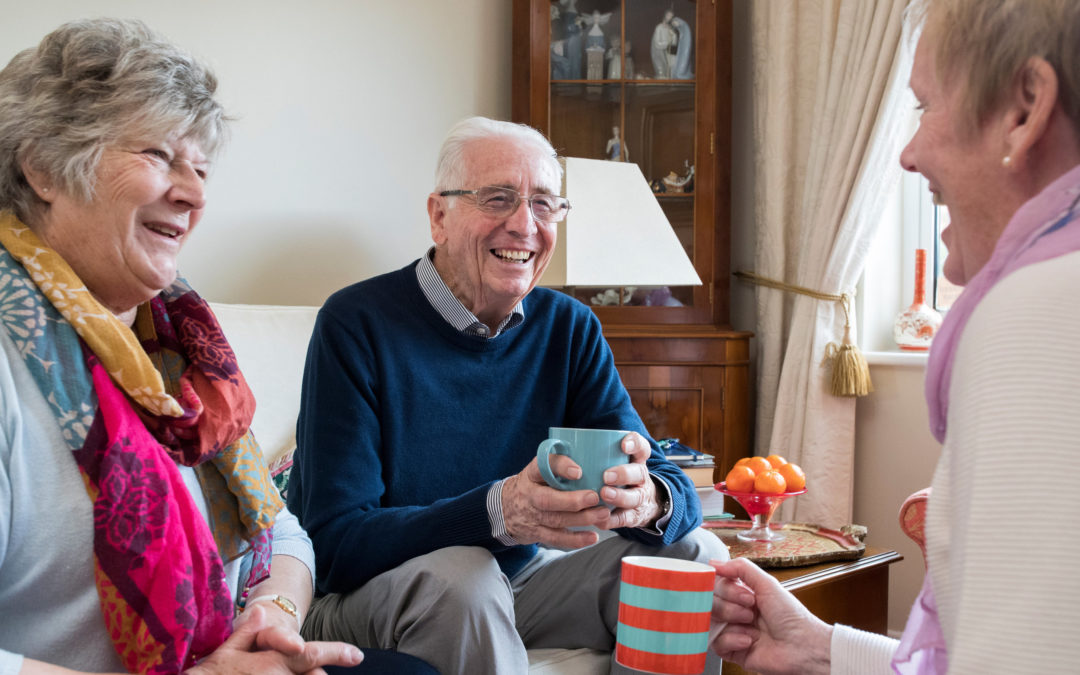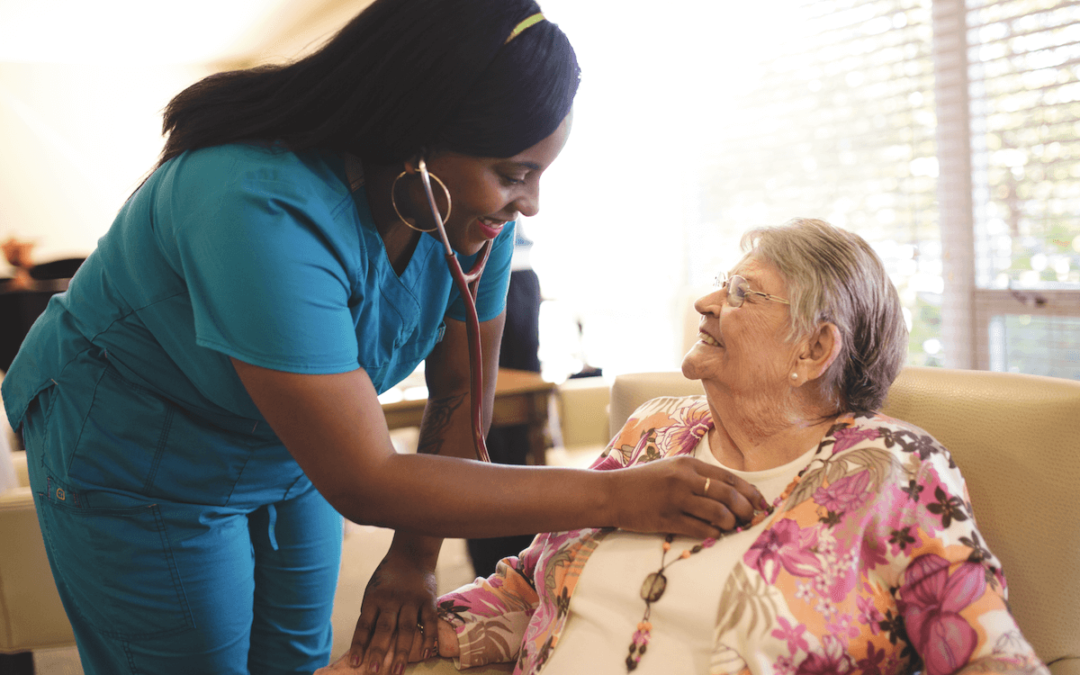
Feb 22, 2023
As our loved ones age, it can be a difficult and emotional decision to consider moving them into a senior living community. While it’s natural for adult children to want the best for their parents, it’s important to remember that the choice of a senior living community should benefit the senior and not their children. If your family is exploring senior living options, here are some reasons it is essential to make sure the senior is involved every step of the way.
The Choice of a Senior Living Community Should be for the Benefit of the Senior, Not Their Children
Consider Individual Needs, Desires, and Preferences
The primary reason that the choice of a senior living community should benefit the senior is that they are the ones who will be living there. It’s important to consider their individual needs, desires, and preferences when choosing a community. While adult children may have the best of intentions, they may not fully understand the needs and wishes of their aging parents. That’s why it’s essential to involve the senior in the decision-making process and prioritize their input.
What Care and Support is Needed?
Another reason to prioritize the senior’s needs is that they are the ones who will be receiving care and support in the community. Senior living communities are designed to provide a range of services and amenities to meet the needs of aging adults, from assistance with daily tasks to medical care. By choosing a community that best fits the senior’s needs, they can receive the level of care and support that they require to maintain their health and well-being.
A Happy, Comfortable Living Arrangement
Additionally, seniors who are involved in the decision-making process tend to feel more in control of their lives. Moving into a senior living community can be a significant change, therefore, it’s essential to ensure that the senior is comfortable with the decision. When seniors are actively involved in the process and have a say in where they will live, they tend to have a more positive experience and feel more satisfied with their living arrangements.
Important Considerations
When choosing a senior living community, there are several factors to consider. Important factors to consider include:
- The level of care provided
- Social opportunities
- Amenities
- Location
- Cost
It’s important to research different senior living communities and tour them to get a feel for what they offer. Encouraging the senior to participate in these senior community tours and to ask questions can help them to feel more engaged in the decision-making process.
Put Your Loved Ones Needs First
The choice of a senior living community should benefit the senior, not their children. It’s essential to involve the senior in the decision-making process and prioritize their individual needs and preferences. By choosing a senior living community that best fits the senior’s needs, they can receive the level of care and support they require to maintain their health and well-being. Moving into a senior living community can be a positive and fulfilling experience for seniors, and it’s important to ensure that they are comfortable with the decision and feel in control of their lives.
Nye Health Services | Award-Winning Senior Living Facilities & Services
Nye Health Services was established in 1989 on the philosophy that older adults deserve services that recognize the individual and are tailored to their unique needs. As a company, we do not aspire to be the largest, instead, we aim to uphold our mission by providing award-winning health services that make our residents feel genuinely cared for and connected while realizing life’s joy.
If you are searching for an established senior living community near you, explore one of our three locations in Fremont (Nye Legacy, Nye Square, & Nye Pointe), Norfolk (The Meadows), and Lincoln, Nebraska (Gateway Vista). Each campus provides award-winning health and wellness services, comfortable apartments and/or suites, with numerous amenities to help you live life to the fullest!

Feb 7, 2023
Caring for an elderly loved one can be one of the most rewarding experiences, but it can also be incredibly stressful and overwhelming. It’s not uncommon for caregivers to experience feelings of guilt, exhaustion, and burnout as they try to balance their own needs with those of the person they’re caring for. If you’re feeling overwhelmed, here are some tips for managing stress and taking care of yourself as a caregiver.
Tips For Managing Caregiver Stress
Set Realistic Expectations
One of the most significant sources of stress for caregivers is unrealistic expectations. Caregiving is a challenging task, and it’s important to understand that it’s okay to make mistakes and have days when you don’t feel up to it. Set realistic expectations for yourself, and don’t try to do too much at once. Remember, it’s better to do a few things well than to try to do everything and do it poorly.
Take Regular Breaks
It’s important to take regular breaks to avoid caregiver burnout. Whether it’s a few minutes of quiet time each day or a weekend getaway, setting aside time to take breaks can help you recharge and come back to caregiving with a fresh perspective. Don’t be afraid to ask for help from family members or friends, or delegate tasks to others when you need to take a break.
Find Support
Caregiving can be a lonely experience, and it’s important to find support from family and friends or a support group who understands what you’re going through. Joining a support group for caregivers, talking to friends and family, or seeking counseling can help you manage stress and find support from others who understand what you’re going through.
Practice Mindfulness
Mindfulness practices, such as meditation, deep breathing, and visualization, can help you stay focused, calm, and centered in the present moment. These practices can also help you reduce stress and feelings of anxiety and worry. Take a few minutes each day to practice mindfulness, and you’ll be amazed at the difference it can make for you and the person you’re caring for.
Get Enough Sleep
Lack of sleep can increase stress levels and make it harder to manage caregiving responsibilities. Make sure to get at least seven hours of sleep each night to help you feel refreshed and rejuvenated. Establish a consistent sleep schedule and create a relaxing bedtime routine to help you fall asleep and stay asleep. Avoid caffeine, alcohol, and electronics in the evening, as they can disrupt sleep patterns.
Eat a Balanced Diet
Eating a healthy, balanced diet can help improve your mood, increase energy levels, and boost your overall physical and mental health. Make sure to include plenty of fruits, vegetables, and whole grains in your diet, and avoid processed foods and sugary snacks. If you’re feeling overwhelmed and don’t have the energy to prepare meals, consider ordering meals delivered or hiring a professional caregiver to help with meal preparation.
Prioritize Self-Care
Taking care of yourself is just as important as taking care of your loved one. Make time each day for activities that bring you joy, whether it’s reading, gardening, or spending time with friends. Engage in regular exercise, whether it’s a walk around the block or a yoga class. And, don’t be afraid to ask for help or delegate tasks when you need to take a break and focus on your own needs.
Managing Caregiver Stress and Burnout
Caring for an elderly loved one can be a stressful and challenging experience. However, with these tips, you can manage stress and take care of yourself while providing the best possible care for your loved one.
At Nye Health Services, we stress the importance of maintaining a balance between caregiving responsibilities and the rest of your life in order to minimize burnout and be the most effective caregiver you can be.
Contact us today to learn more about the services we offer to help care for seniors in our communities.
Nye Health Services | Award-Winning Senior Living Facilities & Services
Nye Health Services was established in 1989 on the philosophy that older adults deserve services that recognize the individual and are tailored to their unique needs. As a company, we do not aspire to be the largest, instead, we aim to uphold our mission by providing award-winning health services that make our residents feel genuinely cared for and connected while realizing life’s joy.
If you are searching for an established senior living community, explore one of our three locations in Fremont (Nye Legacy, Nye Square, & Nye Pointe), Norfolk (The Meadows), and Lincoln, Nebraska (Gateway Vista). Each campus provides award-winning health and wellness services, comfortable apartments and/or suites, with numerous amenities to help you live life to the fullest!

Dec 30, 2022
When considering a senior living community in Nebraska, you may wonder whether it’s better to go with a well-known and established community or one that is more recently established. While both options have their merits, there are many benefits to choosing an established senior living community. Let’s take a look at some of those benefits.
The 5 Benefits of Choosing an Established Senior Living Community in Nebraska
1. Peace of Mind
One of the most significant benefits of choosing an established senior living community is that you can be confident in the safety and security of the facility. Established senior living communities have strict safety protocols that team members are extensively trained to follow daily.
Most communities are also equipped with a state-of-the-art security system that monitors areas 24/7. Furthermore, they have emergency protocols in place should something happen, as well as a track record for responding quickly and efficiently to any issues that arise.
2. Amenities & Activities
Established senior living communities like Nye Health Services offer residents access to amenities and activities that are second to none. From state-of-the-art fitness centers to swimming pools and libraries, most senior living residences will provide something for everyone.
Many senior living options also offer movie nights, group outings, fitness classes, special events, cooking demonstrations, and much more. With all these options available onsite or nearby, your loved one can stay active and engaged without leaving the comfort of their own home.
3. Experienced Staff
When you choose an established senior living community, you can trust that the staff is experienced in caring for seniors with various needs and abilities. They will be able to provide personalized attention while still ensuring that all residents receive the same high-quality care regardless of age or ability level.
Plus, if any special requests come up or medical care is needed beyond what the staff can provide onsite, they will be able to quickly connect your loved one with specialists who are familiar with their individual needs as well as the services offered by the community itself.
4. Resident Satisfaction
Established communities also tend to have higher resident satisfaction ratings because they have had time to perfect their services and amenities over the years. These communities typically take great pride in offering quality care and services so that their residents can live life to its fullest potential.
The best senior living communities offer a variety of activities tailored to each individual resident’s tastes, lifestyle preferences, physical abilities, and interests – ensuring each person has plenty of opportunities for enjoyment in their day-to-day lives.
Moreover, these communities often have strong relationships with local vendors, which allows them to provide additional services – further enhancing the quality of life for their residents.
5. Financial Stability
Finally, when looking at an established senior living community, you can be sure that it is financially stable due to its longevity in the industry. This means you can rest assured knowing your money is going toward a facility that will be providing quality care for its residents for many years down the road!
Choose an Established Senior Living Community in Nebraska
Choosing an established senior living community comes with many advantages—peace of mind that safety protocols are in place; access to amenities and activities that keep seniors active; experienced staff who know how best to meet individual needs; and more—all helping create a safe environment where aging adults thrive.
When it comes time for you or your loved one to decide where they want to live out their golden years, look no further than an established senior living community like Nye Health Services! It could very well be the best decision you ever make!
Nye Health Services | Award-Winning Assisted Living Facilities
Nye Health Services was established in 1989 on the philosophy that older adults deserve services that recognize the individual and are tailored to their unique needs. As a company, we do not aspire to be the largest, instead, we aim to uphold our mission by providing award-winning health services that make our residents feel genuinely cared for and connected while realizing life’s joy.
If you are searching for an established senior living community near you, explore one of our three locations in Fremont (Nye Legacy, Nye Square, & Nye Pointe), Norfolk (The Meadows), and Lincoln, Nebraska (Gateway Vista). Each campus provides award-winning health and wellness services, comfortable apartments and/or suites, with numerous amenities to help you live life to the fullest!
8 Questions To Ask When Choosing a Senior Living Community

Dec 13, 2022
When it’s time to move to a senior living community, there are many things to consider. From location and amenities to price and care options, it’s important to do your research to find a community that suits you or your loved one. Here are eight questions to ask when touring/choosing a senior living community in Nebraska to help you make the best decision.
8 Questions To Ask When Choosing a Senior Living Community in Nebraska
1. What type of community is this?
There are several types of senior living communities, from independent living communities and assisted living communities to memory care and nursing homes. Knowing what levels of care are offered at each community you visit is important.
2. What services are available?
One of the first things you’ll want to find out is what services are included in your senior living community. Most communities will include basic services such as meals and housekeeping, but some may also offer additional amenities like transportation or on-site medical care.
It’s important to find out what’s included so you can make sure the community you choose is the right fit for your needs.
3. What is the cost?
Of course, the cost is always an important consideration when making any major purchase. The same is true when choosing a senior living community. Make sure you can afford the monthly fees and still have money left over for other things.
Be sure to ask about the cost of different apartments or homes, as well as the monthly fees for amenities and services.
4. What type of housing units are available?
Most senior living communities offer a variety of housing units, from apartments and condos to duplexes and single-family homes. Find out what types of units are available and which units fit your lifestyle and budget the best.
5. What amenities are offered?
Amenities can vary greatly from one community to another. It’s important to find out what’s included. Some communities may offer a fitness center, swimming pool, or golf course while others may have a library, computer lab, or theater room.
6. Is transportation provided?
If transportation is not provided by the senior living community, be sure to inquire about public transportation options in the area. If public transportation is not an option, find out if there are any local taxi or Uber services available.
7. How often is housekeeping provided?
Housekeeping services may be offered daily, weekly, or monthly depending on the community you choose. Be sure to ask about frequency and cost so you can plan accordingly.
8. What is the Community’s Reputation?
When searching for a senior living community, it’s important to do your research and read reviews from current and former residents. Talk to your friends and family members who may have experience with different senior living communities in your area. These first-hand accounts can give you valuable insights that you might not otherwise have access to.
You can also check out online resources such as Caring.com for reviews and ratings of different senior living communities in Nebraska near you.
Choosing a senior living community is a big decision. However, by doing your research and asking the right questions, we know you will find a place that’s perfect for you or your loved one. These questions provide a great starting point for your search. Our admissions team at Nye Health Services is always happy to answer any additional questions you may have about our senior living communities in Fremont, Norfolk, and Lincoln, NE.
Nye Health Services | Award-Winning Assisted Living Facilities
Nye Health Services is passionate about providing older adults with a wide range of wellness and health services that maximize health and well-being. If you are searching for an assisted living community, explore one of our three locations in eastern Nebraska. Each campus provides award-winning health and wellness services, comfortable apartments and/or suites, and numerous amenities to help you live life to the fullest!
Contact Nye Health Services to learn more about the senior services we offer or schedule a tour at any of our senior living communities in Fremont (Nye Legacy, Nye Square, & Nye Pointe), Norfolk (The Meadows), and Lincoln, Nebraska (Gateway Vista)!

Nov 15, 2022
Thanksgiving is a time to give thanks, enjoy delicious food, and spend time with loved ones. If you are a resident of an assisted living community, or if you have a loved one who is, you may be wondering how to celebrate Thanksgiving. Rest assured, there are plenty of ways to enjoy the holiday and make it memorable whether you live close to family or far apart. Here are some tips on how to celebrate and make the most out of Thanksgiving in assisted living.
How to Celebrate Thanksgiving in Assisted Living
Create a Festive Space
Get into the holiday spirit by hanging up some of your favorite fall and Thanksgiving-themed decorations. From garlands and wreaths to tablecloths and centerpieces, a little holiday cheer can go a long way. Try to incorporate items from past Thanksgiving that remind you of your favorite holiday memories.
Enjoy a Special Thanksgiving Meal
Just because you’re not cooking a turkey doesn’t mean you can’t enjoy a delicious Thanksgiving feast. If your family lives close by, make plans to join them for a special meal or talk to staff members/activities directors about hosting a potluck on campus with your family members in one of the gathering rooms.
Utilizing a gathering room on campus may depend on the county’s COVID-19 positivity rate, so please check with the campus directly to confirm availability and the current COVID-19 protocols. Learn more about our current COVID-19 policies and visitation guidelines here.
If your family lives far away, talk to the team members about joining your friends and team members for a meal on campus.
Enjoy Community Events
Many assisted living facilities will host special Thanksgiving events and themed activities leading up to and on the holiday. This is a great way to meet new people and get involved in your assisted living community.
Nye Health Services team members are passionate about celebrating special events to ensure residents feel at home even if they are far away. Talk to the team members and check the activity calendar to ensure you know what special events are going on this holiday season.
Reminisce about past holiday memories
Holidays are the perfect time to revisit favorite memories. Old photos are a great way to remember happy Thanksgiving holiday memories. Bring old photos of your favorite memories if you are visiting a loved one. You’ll be surprised how remembering happy times can help spark conversation, even for loved ones suffering from dementia.
Celebrate Virtually
If you live far away from your loved one in assisted living, talk to them ahead of time about their plans. If they’re planning on attending any community events or having a mini-feast with other residents, let them know that you’re happy for them but will miss them. Just knowing that you’re thinking of them will help them feel connected to you and make the holiday special.
Schedule a video call
Technology has made it easier to stay in touch with loved ones who live far away. If you can’t be there in person, schedule a video call with your loved one on Thanksgiving day. You can catch up, chat about your plans for the day, and even share a meal together (virtually).
No matter how you choose to celebrate, Thanksgiving is a time to be grateful for all the wonderful things in our lives. From our families and friends to our homes and communities, there’s so much to be thankful for.
Nye Health Services | Award-Winning Assisted Living Facilities
Nye Health Services is passionate about providing older adults with a wide range of wellness and health services that maximize health and well-being. If you are searching for an assisted living community, explore one of our three locations in eastern Nebraska. Each campus provides award-winning health and wellness services, comfortable apartments and/or suites, and numerous amenities to help you live life to the fullest!
Contact Nye Health Services to learn more about the assisted living amenities we offer or schedule a tour at any of our senior living communities in Fremont (Nye Legacy, Nye Square, & Nye Pointe), Norfolk (The Meadows), and Lincoln, Nebraska (Gateway Vista)!

Oct 17, 2022
As we age, it’s not uncommon to experience more aches and pains. We may find it harder to get up from a chair or walk around the block. These are all natural side effects of aging. However, just because they’re common doesn’t mean we have to resign to living with them. Physical therapy can help seniors maintain their quality of life by keeping them mobile and pain-free.
There are many different types of physical therapy exercises that can be tailored to each individual’s needs. A physical therapist will work with you to design a plan that meets your unique needs and helps you achieve your goals.
The Benefits of Physical Therapy for Seniors
Here are the top five benefits physical therapy services can provide seniors:
Increased Strength and Endurance
As people age, they often lose muscle mass and bone density. This can lead to reduced strength and endurance, making it difficult to perform daily tasks. Physical therapy can help seniors build muscle strength and improve their endurance so they don’t have to worry about becoming overly fatigued during activities like walking or shopping.
In addition, physical therapy can also help seniors improve their cardiovascular health. This is important because cardiovascular disease is the leading cause of death among adults over the age of 65. By improving their cardiovascular health, seniors can reduce their risk of heart attack, stroke, and other serious health conditions.
Improved Balance and Coordination
Reduced muscle mass and bone density can also lead to reduced balance and coordination. This can make it difficult for seniors to stay steady on their feet and maintain their balance when walking or standing. Physical therapy can help improve balance and coordination by strengthening the muscles that support the joints and helping patients practice tasks requiring coordination.
Increased Flexibility
Improved balance and coordination can also lead to increased flexibility. This is important because it can help seniors reduce their risk of falling. Physical therapy can help increase strength and flexibility by stretching the muscles and joints. In addition, physical therapy can also help improve range of motion, which is important for maintaining independence long term as people age.
Decreased Pain
Physical therapy also helps seniors manage pain. Seniors may experience pain due to conditions like arthritis, which is caused by the deterioration of the cartilage that cushions the joints. Physical therapy can help decrease pain by using techniques like heat, cold, massage, and electrical stimulation. In addition, physical therapy can also help improve joint function, which can reduce pain in affected areas.
Improved Mobility
Finally, physical therapy can also help improve mobility. This is important because it allows seniors to remain independent as they age. Physical therapy does this by strengthening the muscles that support the joints and helping patients practice moving differently. In addition, physical therapy can also help reduce stiffness in the joints, which makes it easier to move around.
If you’re looking for ways to stay physically fit, healthy and independent as you age, look no further than physical therapy. Physical Therapy will help you improve your strength and balance, and regain your mobility.
At Nye Health Services, our outpatient therapy program is a top choice among patients throughout Nebraska and surrounding areas that want to maintain independence and recover from a mild to moderate injury.
Nye Health Services | Independent & Assisted Living Communities
Nye Health Services is passionate about providing older adults with a wide range of wellness and health services that maximize health and well-being. If you are searching for a senior living community, explore one of our five locations in eastern Nebraska. Each campus provides award-winning health and wellness services, comfortable apartments and/or suites, and numerous amenities to help you live 2022 to the fullest!
Contact Nye Health Services to learn more about our outpatient therapy services or schedule a tour at any of our senior living communities in Fremont (Nye Legacy, Nye Square, & Nye Pointe), Norfolk (The Meadows), and Lincoln, Nebraska (Gateway Vista)!






